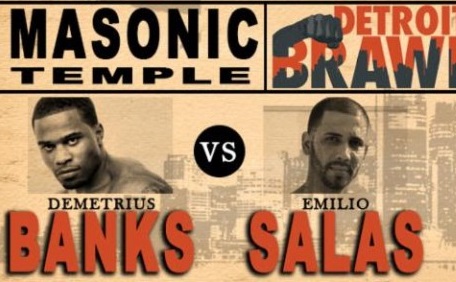Dmitriy Salita sees Detroit’s rebirth in ‘Brawl’ series

This is a period of economic re-invention in our nation, with virtually all vocational sectors experiencing growing pains, and instability, as technological advancements affect institutions which hadn’t maybe seen the radical nature of this progress.
Boxing is and isn’t part of this new reality.
Yes, technology is making it easier to distribute content, so we’re seeing more variety of material from the world over here in America. And instability — that’s present with the sport having been swept up in an experiment which will prove or disprove that boxing can, when offered off cable more, gain traction and viewership approaching the other non-niche sports. The jury is still deliberating on the Al Haymon play.
And meanwhile, next generations of fighters and promoters navigate the current environment. On Saturday, Dmitriy Salita unfurls his second “Detroit Brawl” card, which takes place downtown at the Masonic Temple.
Salita lives in Brooklyn and also has family and spends much time in Michigan, and he has regularly run cards in Manhattan and Brooklyn the last few years. His first “Detroit Brawl” ran May 14. This Saturday show, truly a club show compilation, is filled with fighters seeking to edge their way up the ladder. Whereas typically his shows will have one or two guys who have fought for a world or regional title, this batch of pure prospects on a card is meant to build a base in Detroit.
Demetrius Banks will be helping fill the Temple, Salita believes. He’s a cruiserweight, lives in Detroit, owns a 6-0 record. He meets and rudely greets Emilio Salas, a Puerto Rican living in Yonkers, New York. These are two men still fights away from even being considered for a ShoBox slot, but they headline. Why? Because Salita is looking to do a grassroots buildup. He tabs the 35-year-old Banks as someone to build around. Same with with 6-0 super middleweight James Ballard, age 26, who should be able to gain his seventh win against 6-18 Edgar Perez. Another Detroiter sits high atop the card; 8-0 Dorell Van Horn Jr., a middleweight, should have his hand raised after fighting crafty Mexican Francisco Reza (13-17). And James Smith and Clarence Dubose and Antonio Urista all call Michigan home. So you get the theme … Salita is assessing talent, seeing who has promise, seeing what kind of following they have, putting them on a card together, and seeing how the community responds.
I asked the 34-year-old promoter about this focus and about doing his thing in NY, and also Michigan. “Both New York and Detroit produced some of the best fighters in the world,” the Ukrainian-born dealmaker answered. “The gyms and boxing culture in Detroit is rich like NYC. The boxing scene in Detroit in terms of shows and development of fighters is almost non-existent these days but back in the day Emanuel Stewart had world championship fights and a rich history of training and developing the best of the best. Now his nephew, ‘Sugar’ Hill, is carrying that torch in terms of developing and helping the local fighters.”
And you hope and expect the community to show up, band together, rally around these local athletes?
“Yes, I expect this series to develop world champions and consistency and competitive fights is what is going to revive the local boxing scene,” Salita said.
Wolfgang Mueller heads up the commission which oversees boxing in Michigan. “Dmitriy brings a new perspective, the sophistication of the East Coast,” Mueller told me. “He’s run successful shows in New York. I welcome him coming here, and I know his efforts here help elevate everyone here. Boxing here is like Detroit, experiencing a rebirth.”
But he wants more, and understands the shows can’t feature record-building mismatches. He’s seen the Dirrell brothers and K9 Bundrage rise up, win crowns, but knows that there could be more done to feature those sorts of standouts locally, build up more promotable events which could land on TV, and serve as an advertisement for the region. Mueller seems like an eyes-wide-open pragmatist. One potential positive indicator is that he boasts a roster of ex-fighters on the commission: Bronco McKart, Hilmer Kenty and Jeff Styers all enjoyed success in the arena and can do more than theorize about successful practices that can lift up the Detroit and Michigan pugilism scene. “This is the best collection of boxing experience in the history of the Michigan Boxing Commission, now the Unarmed Combat Commission,” Mueller said.
“Where we are, we welcome guys like Dmitriy, we like new blood, we like giving local fighters more chances to work. I’m curious to see how the Saturday show does, to see these athletes continue to be built up. We believe and hope attendance keeps on improving.”
There exists a mood to lift up the sport, and some infrastructure in place which could be vital in buoying the push. Salita has Greektown Casino aboard as a sponsor and you’d think maybe the two other casinos there, MotorCity Casino and MGM Grand Detroit, might also like to latch on to this ascendant movement.
As ever, the quality of the talent does the most in terms of uplift. If and when a Thomas Hearns twin re-explodes out of a dingy local gym onto a Detroit card, then you will see pushing and shoving among those wanting to attach themselves to the shooting star. Salita gets it, and has a strong sense about the role of his level of promoter circa 2016, within the changing landscape of TV outlets and Haymon’s increased footprint and so on. “It’s about building the relationship of fans with the fighters and not only local talent will fight on these shows,” he said. “I definitely see lots of progress in terms of interest and attendance in this show.”















